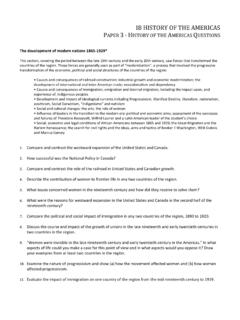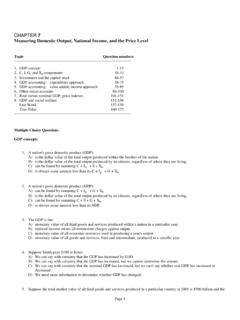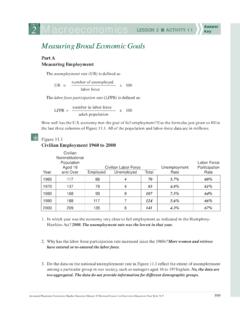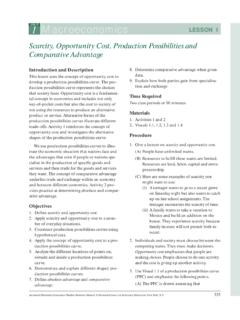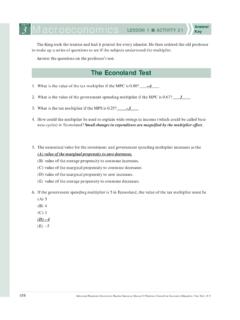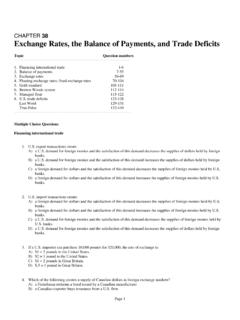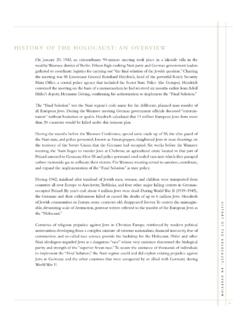Transcription of 1921-1924 Immigration Act of 1921 Imposes Quota System,
1 Immigration Act of 1921 Imposes Quota System, 1921-1924 Historic Events, 2012 Legislation in 1921 to establish a Quota system put an end to the ideal of the United States as a refuge forthose escaping their home country in hope of a better lifeKey FiguresWarren Harding (1865-1923) was the 29th president of the United States, serving from 1921 to 1923. Hesigned the restriction act of 1921 into Wilson (1856-1924) served as the 28th president of the United States from 1913 to 1921. Heopposed restriction and twice vetoed bills calling for a literacy Johnson (1869-1957) was a Republican representative from the state of Washington.
2 He chairedthe House Committee on Immigration and Naturalization and strongly supported total Sabath (1866-1952), a Democratic representative from Illinois who emigrated from Europe at theage of 15 and was a leading opponent of restricting Colt (1846-1924) was a Republican senator from Rhode Island. He chaired the SenateCommittee on Immigration and supported restricting P. Dillingham (1843-1923), another advocate of restriction, served as a Republican senator Grant (1865-1937), an author and lawyer, authored The Passing of the Great Race in America(1916), which strongly promoted Lodge (1850-1924) was a Republican senator from Massachusetts, who supported restriction andadvocated giving literacy tests to potential Roberts (1885-1957)
3 Was a novelist and journalist who supported total of EventDuring most of the nineteenth century, people who wanted to immigrate to the United States were able todo so. By the 1880s, however, this freedom was starting to vanish with the first law that restrictedimmigration in 1882, when the Chinese were barred from entering the United States. Antipathy to Chineseworkers in California triggered Congress to pass this legislation due to job fears and racial bigotry. Manypeople believed that Chinese workers would accept lower wages than whites, enticing employers to hirethem instead of native-born Americans; in addition, there were people who felt the Chinese culture wasinferior and that they would never be a credit to the United States.
4 In 1907, under a gentlemen'sagreement with the government of Japan, the Japanese were added to the undesirables list. Other groupsforbidden from entering the United States were those suffering from mental illness, paupers, polygamists,prostitutes, and those with a "loathsome or contagious disease." In contrast to more than 1,000,000immigrants that were accepted annually from 1890 to 1914, less than 13,000 were excluded as a result ofthese groups, such as the American Protective Association (established in 1887) and theImmigration Restriction League (founded in Boston in 1894), felt that this number was too low, and theycautioned of an "immigrant invasion" that could threaten the American dream.
5 They opposed openimmigration, arguing that the immigrants came from poorer and "backward" regions of Europe. Theywarned that these immigrants would bring ideas of anarchism, communism, radicalism, or socialism withthem, and that due to their preference of living in cities, they'd contribute to the power of crooked Gompers, president of the American Federation of Labor (AFL), supported their opinion, addingthat since the new immigrants would accept low wages, it would lead to lower wages for all Henry Cabot Lodge, a constituent of the Immigration Restriction League, sponsored a billdemanding a literacy test to prove that immigrants were capable of reading and writing in their nativelanguage, and although Congress passed the bill in 1897, President Grover Cleveland rejected it, claimingthat it was discriminatory.
6 Cleveland maintained that the United States should open its borders to anyimmigrant and that sufficient jobs and prospects existed to permit anyone to concretize an ambition offinancial William McKinley's assassination in 1901 led to the banning of anarchists and people whoagitated for the violent downfall of the government. In 1907, the House and Senate set up the UnitedStates Immigration Commission, led by Senator William P. Dillingham, and three years later thiscommission issued a 42-volume report recommending a cutback in Immigration , claiming that immigrantswere "racially inferior.
7 " The commission warned that immigrants from eastern and southern Europe lackedintelligence and were likely to turn to crime or end up poor and sick. It suggested a literacy test andalthough Congress passed literary test legislation in 1912, President William Howard Taft used his vetopower, pointing out that illiteracy came from a dearth of education and was unrelated to inborn Immigration was part of America's history and values, and many of America's most energetic andwealthiest citizens were illiterate when they first arrived on American shores.
8 Had the United Statesexcluded such people, Taft contended, America would never have attained the greatness it 1915, President Woodrow Wilson vetoed another attempt at the literacy bill, condemning it as anegation of America's moral value of an open door. When America entered World War I two years later,however, Congress overruled Wilson's second veto and a reading test was administered to prospectiveimmigrants over the age of 16. In addition, the law excluded those from China, India, and Japan, despiteany degree of literacy. At any rate, the test was elementary and between 1918 and 1920, more than 99percent of immigrants passed it.
9 Representative Albert Johnson, chair of the House Committee onImmigration, tried to suspend all Immigration in 1919, but his proposal was trounced in the House rose dramatically in 1920, with fears that millions of Europe's war refugees were about toinvade the United States. Racism influenced many opinions, with Warren G. Harding, later president of theUnited States, calling for legislation to allow only people whose racial background proved that they couldembrace American values to immigrate . Attorney Madison Grant, who became an adviser to AlbertJohnson's Immigration Committee, authored the most influential book promoting this racist view, ThePassing of the Great Race in America (1916), describing society as a huge snake, with the headconsisting of Nordic races, while the "inferior races" made up the tail.
10 This sort of pseudo scientificargument resulted in the establishment of the 1921 Quota system to ensure that the tail would not rule overthe 1921, the House passed Johnson's bill demanding a two-year moratorium on all Immigration . TheSenate Committee on Immigration declined to support a complete ban after hearing business groupstestify that they needed European laborers. The National Association of Manufacturers also argued thatthey needed access to cheap labor, although some business leaders began to suspect that those in theimmigration camp were poisoned by communism and socialism, particularly after the communists came topower in Russia in 1918.
